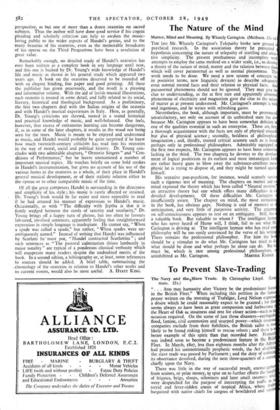The Nature of the Mind
Matter, Mind and Meaning. By Whately Carington. (Methuen. Ps.
THE late Mr. Whately Carington's Telepathy broke new ground psychical research. In the association theory he presented hypothesis concerning the nature of telepathy of startling and mug rive simplicity. The present posthumous and incomplete w attempts to employ the same method on a wider scale, i.e., to develop a theory of the nature of mind, matter and the relation between the which will cover paranormal as well as normal phenomena. work needs to be done. We need a new system of concepts (or in positivist terms, new linguistic devices) to describe adequately even normal mental facts and their relation to physical facts. and paranormal phenomena should not be ignored. They may give t clue to understanding, as the at first rare and apparently abnorm phenomena of electricity and magnetism gave the clue to the natu of matter as at present understood. Mr. Carington's attempt is and ingenious, and he writes with refreshing gusto.
Nevertheless, the book, although important, must be pronoun unsatisfactory, not only on account of its unfinished state but al because Mr. Carington appears to have been somewhat deficient one of the qualities essential in such an enterprise. These are, firs a thorough acquaintance with the facts not only of physical resear but also of physical science ; secondly, boldness of philosophi imagination ; and, thirdly, trained critical acumen such as is fou perhaps only in professional philosophers. Admirably equipped the first two respects, Mr. Carington appears to have been somewha lacking in the third. The two chapters he devotes to the develop ment of logical positivism in its earliest and most intransigent fo are rather heavy guns to blow away the substance-attribute meta physiC he is trying to dispose of, and they might be turned again himself.
His tentative pan-psychism, for instance, would scarcely sums such a rigorous test of meaning. The chapters on matter and o mind expound the theory which has been called "Neutral monism, an attractive theory but one which offers many difficulties in it detailed developments. Of these difficulties Mr. Carington insufficiently aware. The chapter on mind, the most stimulat in the book, has obvious gaps. Nothing is said of memory or anticipation, and very little of purposive activity. The argu on self-consciousness appears to rest on an ambiguity. Still, this a valuable book. But valuable to whom ? The intelligent h who has never heard of Hume will, I think, fail to see what Carington is driving at. The intelligent layman who has read philosophy will be too easily convinced by the verve of his wri There remains the professional philosopher. For him the should be a stimulus to do what Mr. Carington has tried to what should be done and what perhaps he alone can do. But h must be, which is rare among professional philosophers,






































 Previous page
Previous page